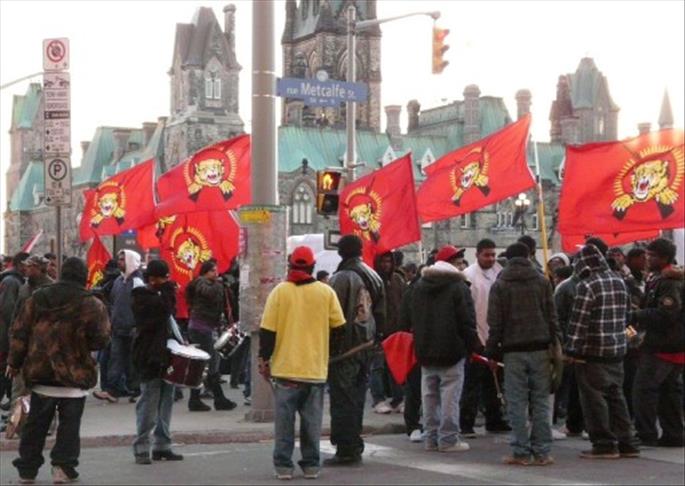When Tamil tigers remembered their suicide unit
Under Tamil Tiger rule, Sri Lanka's north saw parades remembering the Black Tiger suicide attackers, but post-war Sri Lanka has wiped the date away.

MULLAITHIVU, Sri Lanka
For the Liberation Tigers of Tamil Eelam, the rebels who fought a bitter decades-long civil war with Sri Lanka’s government, July 5 was a special, emotional day. It was the day when Tamil Tigers, as the group is popularly known, remembered the elite “Black Tigers” force, who were responsible for carrying out its high-profile suicide attacks.
The date marks the first such attack in 1987. Vallipuram Vasanthan, known as Captain Miller, drove an explosive-laden truck into an army camp in northern city Jaffna, killing 40 soldiers. Every year afterwards, Tamil Tiger leader Velupillai Pirabakaran used to light a lamp in front of a tombstone with photos of Black Tigers. Family members would sprinkle water, lay flowers and burn incense at the graveyards, known as the Resting Home of the Brave, in the country’s north and east.
Since May 2009 however, when the war ended, neither family members nor ex-combatants publicly commemorate the controversial day. That irks some Tamils -- the suicide bombing was often termed a "weapon of the weak" and many believed the Black Tigers had sacrificed for the wider Tamil community.
"Young Tamil women and men have sacrificed their valuable lives to liberate us from inequality. But, we have become very selfish, and have forgotten their yeomen's service and sacrifice," an elderly Tamil man told Anadolu Agency from Mulliyawalai, a former war zone.
Captain Miller joined the Tamil Tigers as a junior cadre but quickly climbed the ranks and volunteered to be a Black Tiger. He hit the army base as the Armed forces were preparing for a major assault on Tamil Tiger forces in Jaffna. It was upon hearing that news, whispered into his ear, that he immediately agreed to the mission.
"He was loving and caring, and a reserved person, and was a brilliant student. We never knew that he was a Black Tiger,” his late mother, Kamaladevi Vallipuram, said in 2005. “He used to come home to have meals with us but never told us that he was a Black Tiger. We came to know about it only after the attack."
"My son has been part of Sri Lanka's history, and has sacrificed his precious life to freedom fight to have equal rights to the Tamil community," tearfully shared Kamaladevi Vallipuram.
Many of Capitain Miller's living family members and the former ex-combatants, many of them under surveillance, refuse to comment in fear for their safety. Sri Lanka's government hailed the "re-integration" of nearly 12,000 former Tamil Tigers after the war but think-tank International Crisis Group highlighted in 2012 that many have faced tight surveilance -- forced to report to police stations, restricted in their movement and subjected to investigations.
"I have lost a lot of fellow combatants in attacks and battles. I remember my fellow combatants dearly. I cannot pay tribute to them in public," says an ex-combatant.
– Signing up, by choice
The Black Tigers became notorious as pioneers of suicide attacks on politicians, military installations and other specific targets. Even during a brief ceasefire period between the Tamil Tigers and the government, and despite popular criticism, the rebels refused to disband the Black Tiger unit, which had become their backbone. Black Tigers were responsible for the assassination of Former Indian Prime Minister Rajiv Gandhi, former Sri Lankan President Ranasinghe Premadasa and attacks on airports and army bases.
Many attacks were unsuccessful however and Tamil Tiger tactics sparked international criticism. A report produced by Human Rights Watch in 2004, accused the group of forcibly recruiting children. The Tamil Tigers also bombed buses and trains and was accused of attacking rival Tamil politicians.
All Tamil Tigers carried a cyanide pill around their neck, to prevent them from being caught alive, but the suicide of a Black Tiger was voluntary. The around 240 Tigers who succeeded in joining the elite unit had to explain, in a letter to their leader Pirabakaran, why they wanted to join the unit. All were submitted to background checks and those chosen were given special, secretive training in jungles, sea and in the air.
"I have written a letter to my leader, and was selected to join the suicide squad. I was trained to kill. I was not afraid to die,” said a female Black Tiger, who asked not to be named. “I joined the Tamil Tigers voluntarily, and wanted to become a Black Tiger, after having witnessed continuous injustices encountered by my community, and wanted to serve and safeguard my people."
Before carrying out their mission, chosen Black Tigers met Pirabakaran, for their last meal and a rare photo opportunity. It was only after all of this, and a successful mission, that the Tamil Tiger leadership informed the families of their children’s Black Tiger identities.
When the Tamil Tigers held the north and east of Sri Lanka, Black Tiger Day was commemorated with flags, flowers, songs and speeches. In post-war Sri Lanka, which has been accused of Sinhalese triumphalism, the families of the Black Tigers have been restricted from mourning their dead. Tamil Tiger graveyards were bulldozed soon after the war’s end and converted for other uses; as offices for security forces, football fields, children’s parks and cashew nut plantations.


